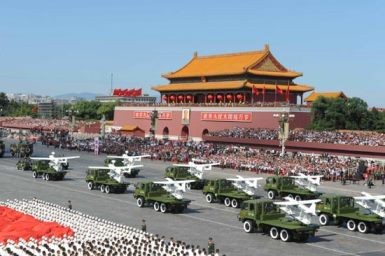The strict control of industrial and automobile emissions imposed by the government ahead of the Sept. 3 military parade has resulted in clear blue skies in Beijing since Aug. 20, the Want China Times reported.
Beijing's environmental watchdog said on Sunday, Sept. 6, that the air quality in the city was "as good as some metropolises of developed countries."
According to the report, the daily concentration of PM2.5 only registered an average of 17.8 micrograms per cubic meter from Aug. 20 to Sept. 3, the period when restrictions were implemented that included work suspension in some factories and construction sites, and curtailment in driving.
The Beijing Environmental Protection Bureau said that the PM2.5 reading was reduced by an average of 73.2 percent year-on-year.
"For 15 days, residents have experienced good air quality," Zhang Dawei, director of the Beijing Municipal Environmental Monitoring Center, said. "It was as good as the annual index in some metropolises in developed countries, such as Paris, London, Moscow and Singapore."
The bureau said that during the events on Sept 3, which marked the 70th anniversary of the end of World War II, the city experienced clear skies and the PM2.5 was at its lowest in two years, at only 8 micrograms per cubic meter.
Zhang said that the reduction on PM2.5 and sulfur dioxide concentrations was mainly due to the restrictions imposed on coal consumption and use of vehicles.
Pan Tao, deputy head of Beijing Research Institute of Environmental Protection, said that the restrictions on the use of vehicles helped more in reducing major air pollutants than the restraints on industry.
During the period, Beijing and its six neighbors, including Tianjin and Hebei Province, also imposed pollution controls to help reduce air pollution for the parade, the report said.
"We have imposed stricter restrictions to curb air pollution, and conducted more frequent inspections to make the implementation better," Fang Li, the deputy head of the bureau, said.
According to Pan and Fang, the air pollution measures recently imposed were more effective than those adopted for the Asia-Pacific Economic Meetings in November.
During the period, around 2,000 companies suspended production, 15 times greater than during the APEC period. Beijing authorities also inspected more than 46,000 companies, 13,000 construction sites and 690,000 vehicles this time.
"We have exposed over 1,000 violations, mainly from vehicles with excessive exhaust emissions and outdoor barbecues," Liang Wenyue, deputy head of the atmospheric management department of the bureau, said.



























